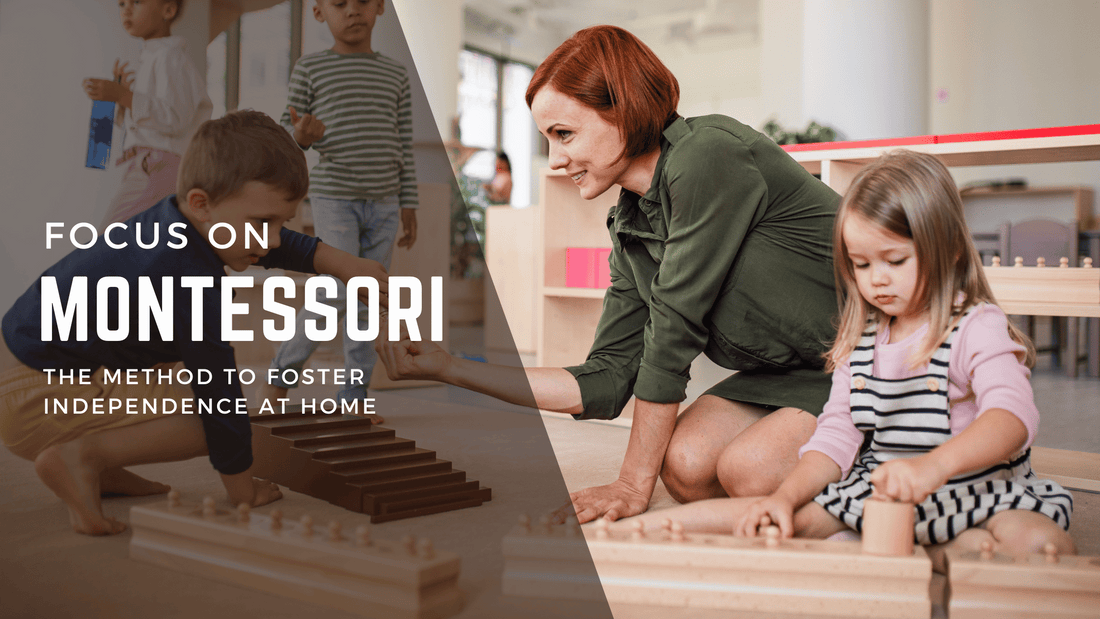
Fostering Children's Independence at Home Through Montessori Learning
Share
The Montessori Method is more than just an educational philosophy—it is a child-centered approach that fosters independence, hands-on learning, and self-motivation. Developed by Dr. Maria Montessori in the early 1900s, this method has been widely adopted in schools worldwide. However, parents can also incorporate Montessori principles at home to support their child’s natural development.
Creating an environment that nurtures autonomy allows children to develop essential life skills, make decisions independently, and build confidence in their abilities. This blog explores what Montessori is, how the method works, how to encourage independence at home, and how Suteki’s ‘Learn’ furniture collection helps parents create a Montessori-friendly space.

What is Montessori?
Montessori is an educational approach that focuses on self-directed learning. Instead of traditional teacher-led instruction, children explore, experiment, and learn through hands-on activities. Montessori environments nurture curiosity, concentration, and independence, allowing children to develop skills naturally rather than through forced memorization.
A fundamental belief in the Montessori philosophy is that children are naturally eager to learn. Given the right environment, they will engage with their surroundings, solve problems, and develop confidence in their abilities. Unlike traditional education systems, which often rely on rigid timelines and grading systems, Montessori learning respects each child’s individual pace of development.

What is the Montessori Method?
The Montessori Method is built on several core principles, with respect for the child being a primary focus. In Montessori settings, children are given choices in their learning, allowing them to take ownership of their education. This freedom helps build confidence and fosters a love for learning.
The method also highlights sensitive periods, where children show heightened interest in learning specific skills, such as language or movement. Recognizing and supporting these phases can significantly enhance a child’s development. A well-structured prepared environment is crucial in Montessori learning. Spaces are organized, calm, and filled with age-appropriate, accessible learning materials, allowing children to explore and interact freely.
By allowing children to make discoveries independently, the Montessori Method encourages self-discipline, problem-solving, and a deep love for learning. Unlike traditional education models that rely on grades and external rewards, Montessori learning fosters internal motivation to master skills and concepts.

Kiko Multipurpose Table and Chair Set
Encouraging Independence the Montessori Way
One of the main objectives of Montessori learning is to foster independence. When children are given the responsibility to complete simple tasks on their own, they develop confidence, resilience, and essential life skills.
A child-friendly environment plays a crucial role in encouraging independence. Homes designed with Montessori principles feature low shelves, accessible materials, and spaces where children can move and explore freely. The Bukku Montessori Front Facing Bookshelf is a great example of how parents can implement this. Its front-facing design allows children to easily see and select their books, promoting independent decision-making and making reading more engaging.
Practical life activities are another essential component of Montessori learning. Instead of artificial play, children thrive when they participate in real-life tasks such as setting the table, watering plants, or preparing simple snacks. A Boori Tidy Foot Step Stool is a great way to enable children to reach higher surfaces and complete tasks independently.
A well-organized space further enhances a child’s ability to explore and learn independently. The Boori Tidy Rotating Bookshelf is an excellent solution for this, as its 360-degree rotating design allows children to browse through books easily, promoting early literacy and independent learning.

How Parents Can Start Implementing Montessori at Home
Parents looking to create a Montessori-friendly home do not need to overhaul their entire space. Small, thoughtful changes can make a big difference in fostering independence.
Setting up child-friendly spaces is one of the first steps. Arranging furniture so that children can move freely, reach for books, and access toys independently helps create an environment where they can explore and learn with confidence.
Introducing practical life skills is another way parents can encourage Montessori learning. Encouraging independent play is equally important. Providing hands-on activities such as building blocks, nature exploration, or art projects allows children to engage in meaningful, self-directed learning.
Limiting screen time also plays a key role in Montessori learning. The approach emphasizes real-world interaction, so encouraging books, outdoor play, and creative storytelling instead of excessive digital entertainment helps children develop stronger cognitive and social skills.

Bukku Montessori Front Facing Bookshelf
Where to Buy Montessori-Inspired Furniture?
For parents who want to set up a Montessori-inspired home, Suteki offers a carefully curated selection of child-friendly furniture designed to promote independent learning.
- The Bukku Montessori Front Facing Bookshelf encourages children to browse books and make independent choices.
- The Boori Tidy Rotating Bookshelf ensures easy access to books and learning materials from all angles.
- The Boori Tidy Foot Step Stool supports children in reaching higher surfaces, helping them take part in household tasks and daily routines.

Check out our Pretend Play Toys which will further foster their imaginary play in a Montessori environment. Find out more about how you can encourage creativity through pretend play here.
The Montessori Method is a powerful approach to learning that nurtures independence, problem-solving, and self-confidence. By creating a home environment that aligns with Montessori principles, parents can support their child’s development in meaningful and practical ways.
Encouraging practical life skills, self-directed learning, and accessible furniture allows children to explore, discover, and build confidence in their abilities. Whether through independent reading, structured play, or household participation, Montessori-inspired spaces provide the foundation for children to learn and grow at their own pace.
Explore Suteki’s ‘Learn’ furniture collection today and start creating a Montessori-friendly home that supports lifelong learning and independence.
